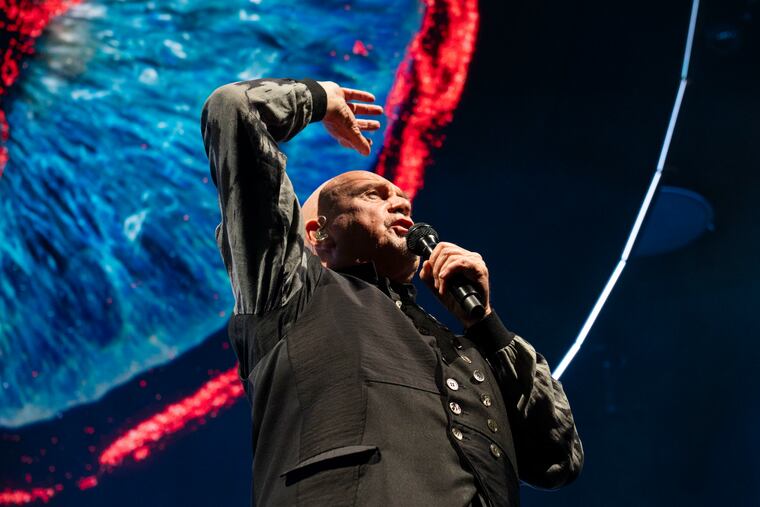Time marches on for Peter Gabriel at the Wells Fargo Center
The veteran British rocker refused to live in the past during a slow-paced but stunning Saturday performance in Philly.

Peter Gabriel clearly wanted the audience at the Wells Fargo Center to have time on our minds.
As fans filed into their seats Saturday night, the circular video screen that dominated the stage was filled with a clock face: The blurred image of an orange jumpsuit-clad technician continually painted on and squeegeed off the minutes.
But Gabriel was thinking on a much grander chronological scale during his nearly three-hour performance. He began the evening alone under a spotlight, musing about the planet’s beginnings 4.5 billion years earlier. A mention of the meteorite thought to have sparked life on Earth brought a single bright light plummeting from the rafters; Gabriel used it to light a virtual campfire at center stage, declaring it “the fire of life.”
Joined by longtime bassist Tony Levin, who seemed to have nearly as many devoted fans as Gabriel himself, the 73-year old singer sat by the fire with a keyboard in his lap for an intimate duo version of “Washing of the Water,” from 1992′s Us; the remainder of the nine-piece band gathered around for “Growing Up,” a song from Up, released a decade later.
It was an unusually somber and hushed way to begin an arena rock concert, but then Gabriel has never been your typical rock star.
From his beginnings with British prog band Genesis to his always unpredictable solo career, he’s always approached music with a theatrical vision and an activist sense of mission. Both were on vivid display Saturday, from the stunning visual accompaniments to each song created in collaboration with artists including Ai Weiwei and Aardman Animation, to Gabriel’s impassioned discourses on the future of AI or the oneness of humanity.
Acknowledging at one point his reputation for being “notoriously slow” in creating and producing his music, Gabriel surely tried the patience of some members of the packed arena.
Anyone hoping for a parade of familiar hits from the singer’s past catalog would be in for a disappointment, as fully half of the 22-song set featured songs from i/o, his first new album in 21 (or possibly 22) years, which has yet to be fully released. The album’s unique rollout is itself evidence of Gabriel’s offbeat approach and glacial pace: He’s unveiled a new song with every full moon since January, eight so far.
The creative process has taken so long that an unfinished version of one of the songs, “Playing for Time” (there’s that word again), opened Gabriel’s last visit to Philly back in 2012. The bulk of the new songs have an ephemeral, elusive beauty, though in their live incarnations they took on a greater urgency from the ensemble’s stellar playing. The surveillance-state diatribe “Panopticom” proved a hard-edged opener to the post-campfire portion of the show, while the new album’s title song provided a fist-pumping chorus, and “Road to Joy” a soulful catharsis.
Of the songs yet to be released, “And Still” was a heartfelt ballad that Gabriel dedicated to his late mother, while “This Is Home” felt warm and nostalgic as the arrayed video screens filled with comforting images of bookshelves and wallpaper.
Though there was no mass exodus to the concession stands or restrooms when Gabriel performed the new material, it was clear what the bulk of the crowd was there to see. Classics like the salaciously silly “Sledgehammer” and the satirically indulgent “Big Time,” both from 1986′s massive So, instantly drove people to their feet and their phones. Gabriel himself perked up for both, engaging with Levin and veteran guitarist David Rhodes in a few playful dance steps. He even took to skipping around the stage during “Solsbury Hill” — and who could blame him?
Throughout, Gabriel lived up to his soliloquies on humanity and communion, offering ample credit to his band members, artist collaborators, and road crew. Speaking of his work with bringing music to apes, he acknowledged the Atlanta-based primatologist Sue Savage-Rumbaugh, who was seated in the front row and received a rousing ovation.
Vocalist and cellist Ayanna Witter-Johnson was a particular standout, called on to fill in for both Youssou N’Dour (on “In Your Eyes,” the first of two encores) and Kate Bush, duetting with Gabriel on a raised balcony for an emotional “Don’t Give Up.”
Gabriel was even first to leave the stage in the end, followed by each musician in turn as the rousing “Biko” was pared down to just Manu Katché's insistent drumbeat, then finally just the image of slain South African activist Stephen Biko. Always an artist with a great deal on his mind, Gabriel ensured that many of his ideas, like his melodies, would linger for quite some time.